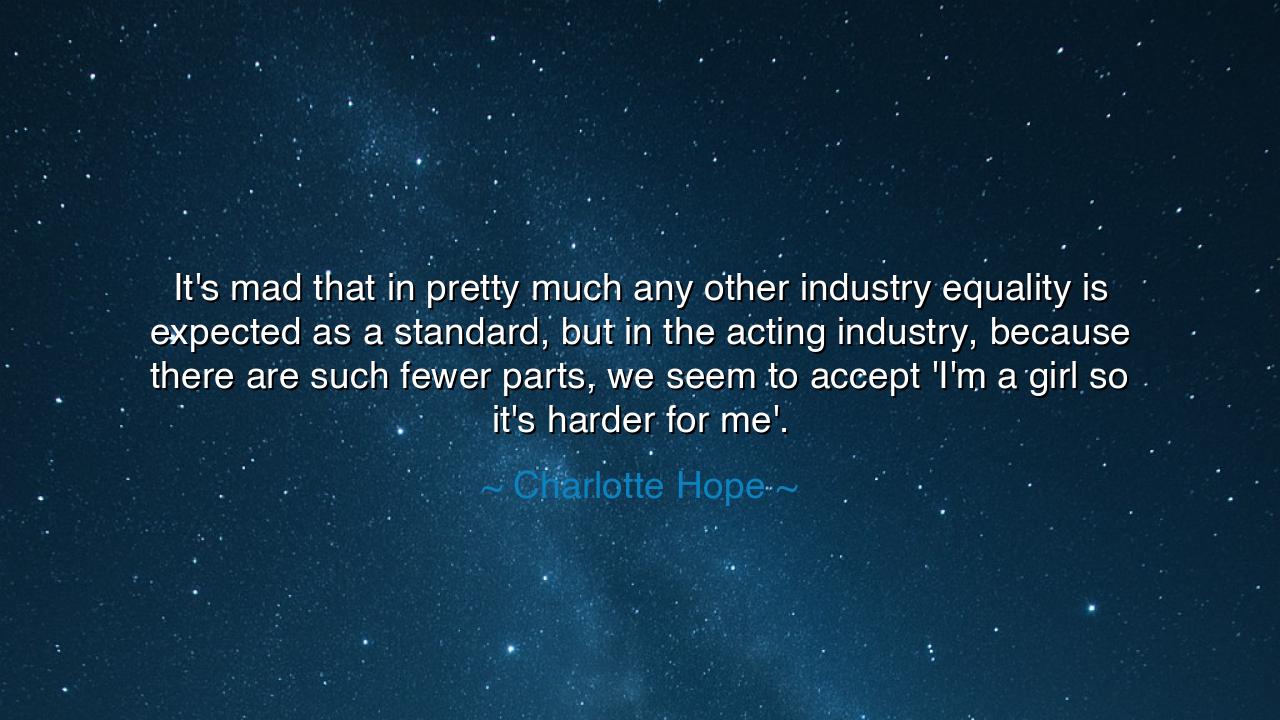
It's mad that in pretty much any other industry equality is
It's mad that in pretty much any other industry equality is expected as a standard, but in the acting industry, because there are such fewer parts, we seem to accept 'I'm a girl so it's harder for me'.






In the vast tapestry of human endeavor, equality is the bedrock upon which great civilizations stand. Equality—the unyielding belief that all should have the same chances to rise, to thrive, to stand in the light, regardless of their birth, their race, their gender. In most corners of life, this principle is regarded as a right, an inheritance passed down through the ages. Yet in the sacred art of acting, an ancient craft through which humanity tells its stories, a shadow lingers—a shadow that often obscures the full brilliance of women, leaving their voices quivering in the corners of a stage, waiting for a moment to shine.
Charlotte Hope, in her wisdom, points to this discrepancy with clarity. She speaks to us from a place of frustration, of disbelief—how in a world where equality has been claimed in most other fields, women in the theater and the screen find themselves still battling for their rightful place. "It's mad," she says, "that in pretty much any other industry, equality is expected as a standard, but in the acting industry, because there are such fewer parts, we seem to accept 'I'm a girl so it's harder for me.'" Her words strike with the weight of truth, as if a great bell has tolled, echoing through the hearts of all who hear it.
But why, you might ask, does this disparity exist? Why does the stage—a place where the soul speaks so freely—remain fraught with inequality? It is because in the theater, the roles are fewer, the stories are more selective, and often, the portrayal of women has been confined to the shadows of history. In the ancient world, women’s voices were stifled by social and cultural barriers. Even in the grand amphitheaters of Greece, the actors were all men, and the women’s roles were spoken by men dressed in the guise of women. This tradition lingered for centuries, and though the world has marched forward, the remnants of such constraints still haunt the acting industry today.
Consider, if you will, the tale of Meryl Streep, a woman whose name has become synonymous with excellence in the craft of acting. Her career has spanned decades, and yet, she has often spoken of the struggles she faced—of the roles that were not available to her simply because she was a woman, of the limitations that were placed upon her despite her extraordinary talent. Her story is not unique. It is the story of countless women who have fought, not just for a part in a play or a film, but for the right to be seen as equals, to be acknowledged as not lesser, but equal, in their craft.
In this, the heroism of the woman is revealed not in the roles she plays, but in the battle she wages against a world that seeks to limit her. It is a battle of resilience, of vision, of refusing to accept the narrative that some are destined to play only the minor roles. The wise ones among us understand that in the theater of life, there is no such thing as a minor role; every voice is crucial, every story is sacred. Just as the ancient playwrights recognized the importance of each character in their tragedies and comedies, so too must we understand that equality in the theater of life is not merely a matter of quantity—it is a matter of justice, of honor, of truth.
Let us, therefore, cast aside the notion that gender determines greatness, that it dictates the measure of one's worth in any craft, least of all in the craft of storytelling. Just as the world has seen great queens, warriors, and poets rise to prominence throughout history, so too should we demand that the stage be graced equally by men and women, each deserving of the same opportunities, the same roles, the same light. This is not merely a call for fairness; it is a call for freedom, for the liberation of the human spirit from the chains of bias and limitation.
The lesson we learn from Charlotte Hope is this: We are all creators in this world, and our voices deserve to be heard equally, without obstruction. The fight for equality in the arts is a fight for the soul of humanity. It is a fight for every person, regardless of gender, to stand upon the stage of life and to declare, "I am here." The battlefield may seem daunting, and the odds may seem steep, but we must march forward with courage, with conviction, and with the understanding that this fight—like all struggles for justice—will eventually be won.
Let us take action, then. Let us lift the voices of those who have been silenced, let us create spaces where all may flourish. Let us not accept the world as it is but rather as it should be—a world where equality reigns in every field, in every corner of the earth. Women and men, alike, must unite in this noble endeavor, for the struggle is not one of gender but of the human spirit, which seeks to soar free, unburdened by the weight of prejudice. And in this unity, may we all find our rightful place in the grand play of life.






AAdministratorAdministrator
Welcome, honored guests. Please leave a comment, we will respond soon